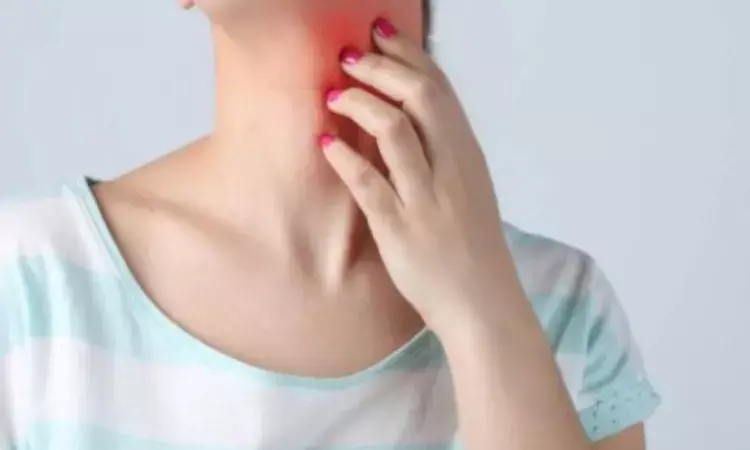- Home
- Medical news & Guidelines
- Anesthesiology
- Cardiology and CTVS
- Critical Care
- Dentistry
- Dermatology
- Diabetes and Endocrinology
- ENT
- Gastroenterology
- Medicine
- Nephrology
- Neurology
- Obstretics-Gynaecology
- Oncology
- Ophthalmology
- Orthopaedics
- Pediatrics-Neonatology
- Psychiatry
- Pulmonology
- Radiology
- Surgery
- Urology
- Laboratory Medicine
- Diet
- Nursing
- Paramedical
- Physiotherapy
- Health news
- Fact Check
- Bone Health Fact Check
- Brain Health Fact Check
- Cancer Related Fact Check
- Child Care Fact Check
- Dental and oral health fact check
- Diabetes and metabolic health fact check
- Diet and Nutrition Fact Check
- Eye and ENT Care Fact Check
- Fitness fact check
- Gut health fact check
- Heart health fact check
- Kidney health fact check
- Medical education fact check
- Men's health fact check
- Respiratory fact check
- Skin and hair care fact check
- Vaccine and Immunization fact check
- Women's health fact check
- AYUSH
- State News
- Andaman and Nicobar Islands
- Andhra Pradesh
- Arunachal Pradesh
- Assam
- Bihar
- Chandigarh
- Chattisgarh
- Dadra and Nagar Haveli
- Daman and Diu
- Delhi
- Goa
- Gujarat
- Haryana
- Himachal Pradesh
- Jammu & Kashmir
- Jharkhand
- Karnataka
- Kerala
- Ladakh
- Lakshadweep
- Madhya Pradesh
- Maharashtra
- Manipur
- Meghalaya
- Mizoram
- Nagaland
- Odisha
- Puducherry
- Punjab
- Rajasthan
- Sikkim
- Tamil Nadu
- Telangana
- Tripura
- Uttar Pradesh
- Uttrakhand
- West Bengal
- Medical Education
- Industry
Dupilumab may reduce pruritus and lesion appearance among patients with prurigo nodularis

Prurigo nodularis (PN) is a distressing inflammatory skin condition marked by itchy, reddish lesions.
Dupilumab may reduce pruritus and lesion appearance among patients with prurigo nodularis, according to a comprehensive review of the extensive systemic therapies. The outcomes of the study were published in Journal of Cutaneous Medicine and Surgery.
The primary goal of interventions is to disrupt the destructive itch-scratch cycle associated with Prurigo nodularis, necessitating a multifaceted approach targeting both immune and neural factors. In a recent evidence review, researchers conducted a meticulous search across databases complemented by an exploration of Google Scholar. This resulted in including 88 studies after the elimination of duplicates and irrelevant findings.
Among the different treatments that were scrutinized in this research that identified several promising drugs to solve the inflammatory condition. Dupilumab emerged as a standout by showcasing the efficacy in reducing both pruritus and lesion appearance with notably fewer side effects. Thalidomide and pregabalin also demonstrated effectiveness with concerns over long-term use were also raised due to pain associated with muscle and nerve.
This extensive review encompassed the diverse treatments such as cyclosporin, methotrexate, lenalidomide, aprepitant, alitretinoin, apremilast, baricitinib, gabapentin, and other drugs offering a comprehensive overview of current therapeutic options.
The findings showed the potential benefits of Janus Kinase inhibitors, suggesting a positive impact on Prurigo nodularis, although the need for large-scale population studies is emphasized.
This outcomes improves the patients suffering with Prurigo nodularis and offers insights into a range of treatments that could significantly improve their quality of life. The understanding of this debilitating skin condition deepens and helps us in the prospect of customized and effective interventions grows, underscoring the importance of ongoing research in dermatological health.
Reference:
McCampbell, L. E., Zaino, M. L., Ranpariya, M., Patel, T., & Feldman, S. R. (2023). Systemic Medication for the Treatment of Prurigo Nodularis—A Systematic Review. In Journal of Cutaneous Medicine and Surgery. SAGE Publications. https://doi.org/10.1177/12034754231211797
Neuroscience Masters graduate
Jacinthlyn Sylvia, a Neuroscience Master's graduate from Chennai has worked extensively in deciphering the neurobiology of cognition and motor control in aging. She also has spread-out exposure to Neurosurgery from her Bachelor’s. She is currently involved in active Neuro-Oncology research. She is an upcoming neuroscientist with a fiery passion for writing. Her news cover at Medical Dialogues feature recent discoveries and updates from the healthcare and biomedical research fields. She can be reached at editorial@medicaldialogues.in
Dr Kamal Kant Kohli-MBBS, DTCD- a chest specialist with more than 30 years of practice and a flair for writing clinical articles, Dr Kamal Kant Kohli joined Medical Dialogues as a Chief Editor of Medical News. Besides writing articles, as an editor, he proofreads and verifies all the medical content published on Medical Dialogues including those coming from journals, studies,medical conferences,guidelines etc. Email: drkohli@medicaldialogues.in. Contact no. 011-43720751


